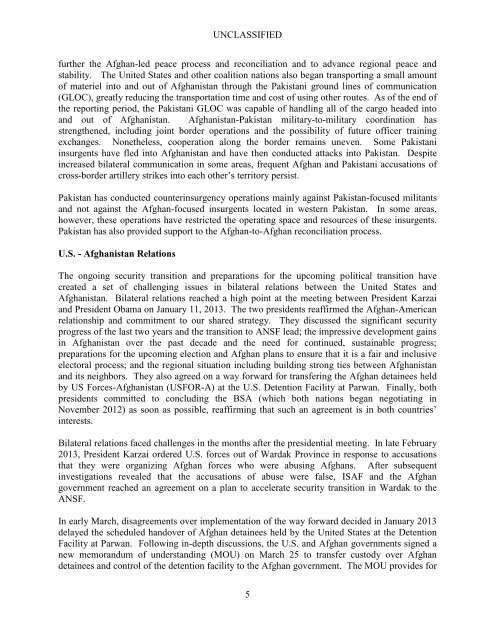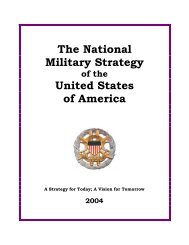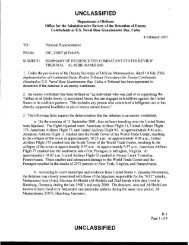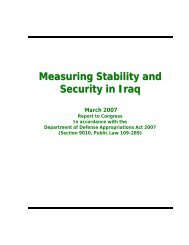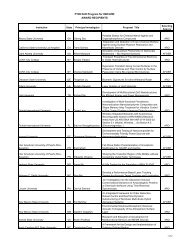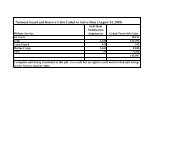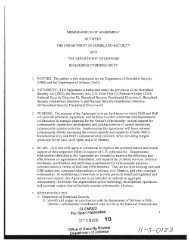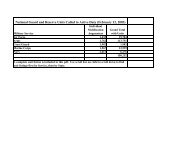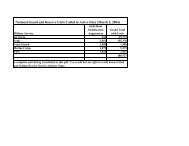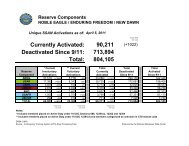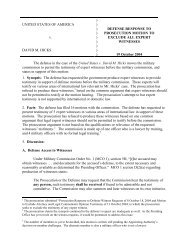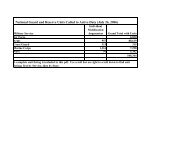Report - United States Department of Defense
Report - United States Department of Defense
Report - United States Department of Defense
Create successful ePaper yourself
Turn your PDF publications into a flip-book with our unique Google optimized e-Paper software.
UNCLASSIFIED<br />
further the Afghan-led peace process and reconciliation and to advance regional peace and<br />
stability. The <strong>United</strong> <strong>States</strong> and other coalition nations also began transporting a small amount<br />
<strong>of</strong> materiel into and out <strong>of</strong> Afghanistan through the Pakistani ground lines <strong>of</strong> communication<br />
(GLOC), greatly reducing the transportation time and cost <strong>of</strong> using other routes. As <strong>of</strong> the end <strong>of</strong><br />
the reporting period, the Pakistani GLOC was capable <strong>of</strong> handling all <strong>of</strong> the cargo headed into<br />
and out <strong>of</strong> Afghanistan. Afghanistan-Pakistan military-to-military coordination has<br />
strengthened, including joint border operations and the possibility <strong>of</strong> future <strong>of</strong>ficer training<br />
exchanges. Nonetheless, cooperation along the border remains uneven. Some Pakistani<br />
insurgents have fled into Afghanistan and have then conducted attacks into Pakistan. Despite<br />
increased bilateral communication in some areas, frequent Afghan and Pakistani accusations <strong>of</strong><br />
cross-border artillery strikes into each other’s territory persist.<br />
Pakistan has conducted counterinsurgency operations mainly against Pakistan-focused militants<br />
and not against the Afghan-focused insurgents located in western Pakistan. In some areas,<br />
however, these operations have restricted the operating space and resources <strong>of</strong> these insurgents.<br />
Pakistan has also provided support to the Afghan-to-Afghan reconciliation process.<br />
U.S. - Afghanistan Relations<br />
The ongoing security transition and preparations for the upcoming political transition have<br />
created a set <strong>of</strong> challenging issues in bilateral relations between the <strong>United</strong> <strong>States</strong> and<br />
Afghanistan. Bilateral relations reached a high point at the meeting between President Karzai<br />
and President Obama on January 11, 2013. The two presidents reaffirmed the Afghan-American<br />
relationship and commitment to our shared strategy. They discussed the significant security<br />
progress <strong>of</strong> the last two years and the transition to ANSF lead; the impressive development gains<br />
in Afghanistan over the past decade and the need for continued, sustainable progress;<br />
preparations for the upcoming election and Afghan plans to ensure that it is a fair and inclusive<br />
electoral process; and the regional situation including building strong ties between Afghanistan<br />
and its neighbors. They also agreed on a way forward for transfering the Afghan detainees held<br />
by US Forces-Afghanistan (USFOR-A) at the U.S. Detention Facility at Parwan. Finally, both<br />
presidents committed to concluding the BSA (which both nations began negotiating in<br />
November 2012) as soon as possible, reaffirming that such an agreement is in both countries’<br />
interests.<br />
Bilateral relations faced challenges in the months after the presidential meeting. In late February<br />
2013, President Karzai ordered U.S. forces out <strong>of</strong> Wardak Province in response to accusations<br />
that they were organizing Afghan forces who were abusing Afghans. After subsequent<br />
investigations revealed that the accusations <strong>of</strong> abuse were false, ISAF and the Afghan<br />
government reached an agreement on a plan to accelerate security transition in Wardak to the<br />
ANSF.<br />
In early March, disagreements over implementation <strong>of</strong> the way forward decided in January 2013<br />
delayed the scheduled handover <strong>of</strong> Afghan detainees held by the <strong>United</strong> <strong>States</strong> at the Detention<br />
Facility at Parwan. Following in-depth discussions, the U.S. and Afghan governments signed a<br />
new memorandum <strong>of</strong> understanding (MOU) on March 25 to transfer custody over Afghan<br />
detainees and control <strong>of</strong> the detention facility to the Afghan government. The MOU provides for<br />
5


